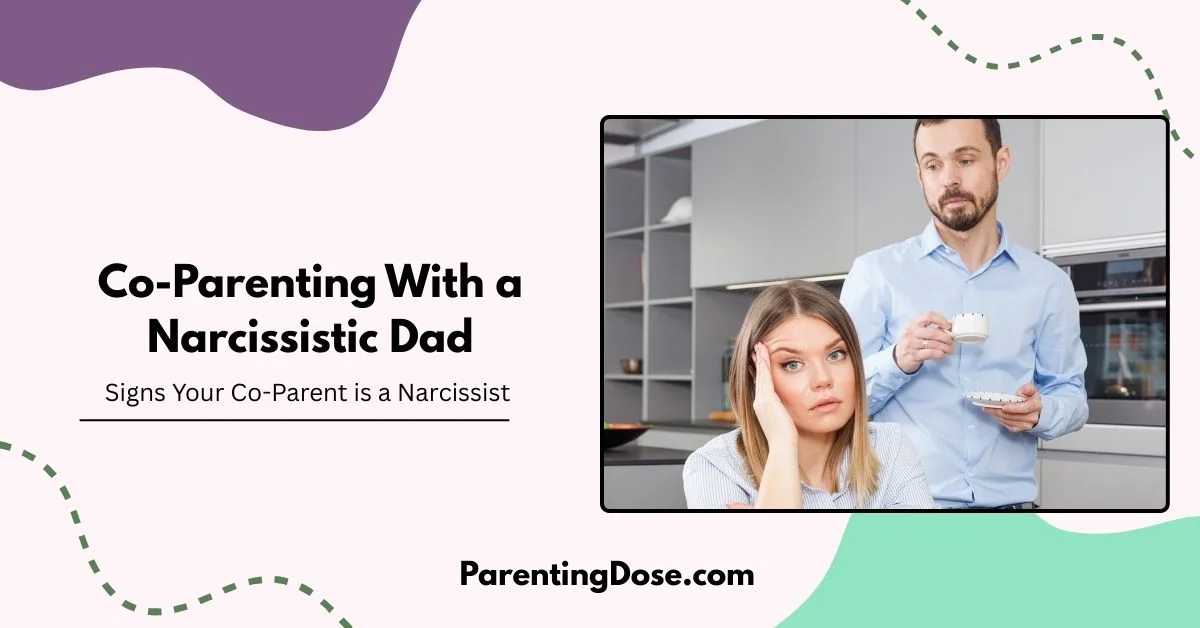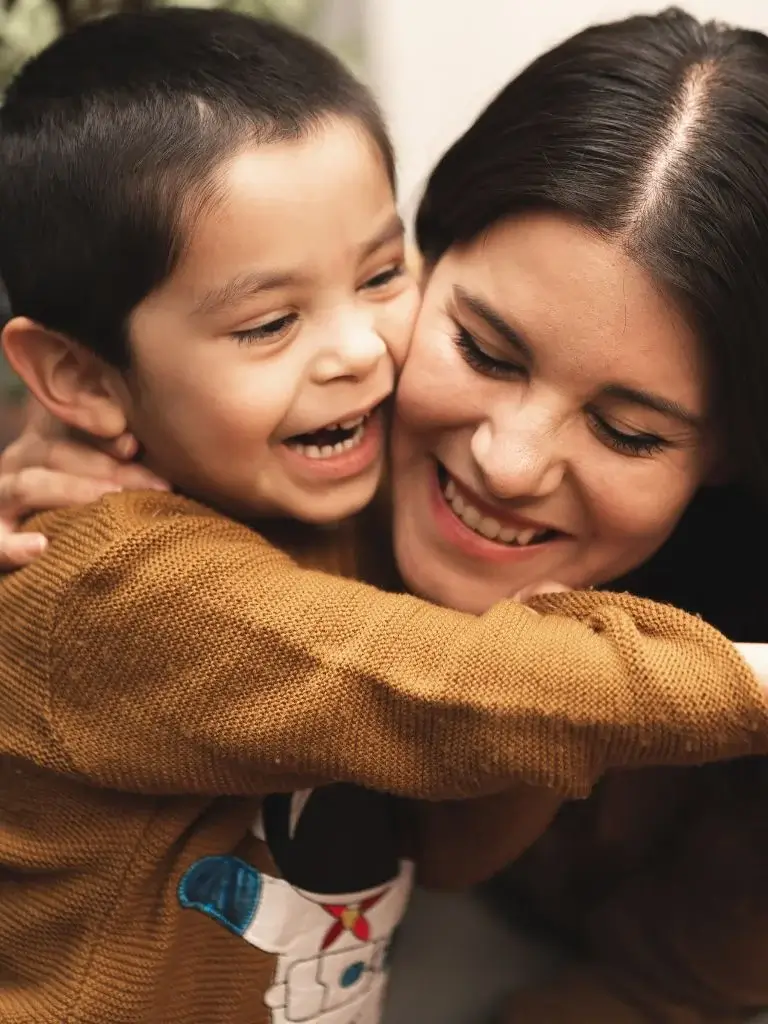If you’re co-parenting with a narcissistic ex and feel like you’re constantly walking on eggshells while juggling your child’s emotional safety — you are not crazy, you are not alone, and you are absolutely not a “bitter baby mama.” You’re a warrior in yoga pants doing the emotional heavy lifting of two people.
Let’s talk about what it’s really like — the messy, exhausting, and often lonely world of co-parenting with a narcissistic dad.
Because this isn’t just “hard.” It’s a whole different kind of hard.
And if you’re Googling at 2 AM “how to co-parent with a narcissist without losing my mind,” you’ve found your people.
What Does a Narcissistic Co-Parent Look Like?
First, a quick (and honest) reality check: just because your ex is difficult or selfish doesn’t automatically make him a narcissist. But if you’re constantly dealing with manipulation, gaslighting, and a relentless need for control — you might be dealing with someone who checks most of the boxes.
Here are some signs your co-parent may be a narcissistic dad:
- He prioritizes his image over your child’s emotional needs
- He rarely accepts responsibility — everything is always “your fault”
- He uses guilt, blame, or confusion to maintain control
- He doesn’t follow the parenting plan unless it benefits him
- He undermines you in front of the kids — subtle or not
- He plays the victim in every story he tells (even the ones where he’s clearly the villain)
- He uses the kids as pawns to punish you or get attention
The Different “Types” of Narcissistic Dads
Not all narcissists are loud and obvious. Some are masters of disguise — charming in public but emotionally volatile in private. Here are a few common types of narcissistic co-parents:
1. The Classic Narcissist
Loud, proud, and constantly fishing for admiration. He’s the guy who needs to “win” parenting, posts selfies at the park once a month, and thinks that makes him Dad of the Year.
Favorite move: Making a spectacle out of doing the bare minimum.
2. The Covert Narcissist
Quiet, passive-aggressive, and oh-so-subtle. He plays the long game of manipulation. Think guilt trips, silent treatment, and “accidentally” forgetting school pickups.
Favorite move: Acting helpless so you end up doing everything.
3. The Vindictive Narcissist
Fueled by revenge and control. If he feels “rejected” by you, he’ll use the kids, court system, or social media to get even.
Favorite move: Threatening to “take the kids” if you don’t comply.
4. The Charmer Narcissist
He’s sweet to your face and sweeter to the judge — but behind closed doors? He’s dismissive, manipulative, and has zero interest in co-parenting unless it serves him.
Favorite move: Gaslighting and rewriting the truth to make you look “unstable.”
If you’re nodding your head or crying a little while reading this — that’s not weakness. That’s recognition. That’s healing.
How to Co-Parent With a Narcissist Without Losing Your Mind (Or Your Sanity)
Alright, now let’s get to the real talk. How do you actually co-parent with someone like this?
Spoiler alert: You don’t “co”-parent. You parallel parent.
Here’s how to protect your peace and your child’s well-being:
1. Parallel Parenting Is Your New Best Friend
Forget the warm-and-fuzzy teamwork version of co-parenting. That’s not happening here — and that’s OK. Parallel parenting means you each parent separately with as little contact as possible.
Set clear boundaries. Communicate only when necessary. Keep emotions out of it.
Use written communication only (email or court-approved apps like OurFamilyWizard). Keep receipts. Keep it brief, factual, and boring.
2. Document Everything (Even the Petty Stuff)
I once got a furious message because I dared to cut my daughter’s bangs without “consulting” him. Meanwhile, he hadn’t been to a pediatrician appointment in two years.
The point? Narcissists twist facts. Your best defense is documentation. Keep a journal, take screenshots, and track patterns of behavior.
Especially when legal stuff comes into play, documentation = protection.
3. Don’t Take the Bait
This is hard. So hard. But arguing with a narcissist is like playing chess with a pigeon — they’ll knock over all the pieces, poop on the board, and strut around like they won.
He wants a reaction. Don’t give him one.
Mute notifications if you need to. Respond when calm. Or don’t respond at all if it’s not necessary.
4. Focus on What You Can Control
You can’t change him — trust me, I tried. What you can do is create a safe, emotionally rich environment for your child when they’re with you.
You are their emotional anchor. You’re the calm in their chaos. That matters more than you know.
Create consistency. Practice emotional validation. Let them feel seen and safe.
5. Don’t Let Guilt Make You Overcompensate
This one hit me like a truck.
I used to go above and beyond to “make up” for the emotional neglect my kids faced with their dad — more toys, more yeses, fewer boundaries.
But here’s the truth: Kids don’t need perfection. They need presence. They need you — steady, safe, loving you.
And sometimes, loving them means saying no. Even when you feel guilty.
6. Therapy Is Not Just Helpful — It’s Essential
Whether it’s individual therapy, trauma recovery, or co-parenting support, having a space where you can safely unpack the madness is life-changing.
Also? It models to your kids that mental health is normal and necessary.
Find a therapist who understands narcissistic abuse. Not all do.
What About the Kids?
Worried your child will be emotionally harmed by their narcissistic parent?
That fear is real. But here’s the hope: one emotionally stable, attuned parent can buffer SO much of the damage.
What matters most is how you show up.
Your empathy, your honesty, your ability to name what’s real without bad-mouthing — that’s powerful. That’s healing.
You can say things like:
- “Daddy has a different way of doing things, and that’s okay.”
- “Your feelings are always safe with me.”
- “It’s not your job to fix grown-ups.”
Final Thoughts:
Co-parenting with a narcissist is a marathon — not a sprint. You’ll have good weeks and deeply frustrating ones. Some days you’ll feel strong; others you’ll cry in the bathroom after drop-off.
But every time you choose calm over chaos, boundaries over battles, and healing over hatred — you are breaking cycles. You are rewriting your child’s emotional blueprint.
And that? That is nothing short of heroic.
💗 Sending you the biggest virtual hug, mama. You’ve got this. You are not alone.






